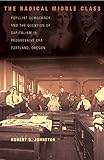The Radical Middle Class : Populist Democracy and the Question of Capitalism in Progressive Era Portland, Oregon / Robert D. Johnston.
Material type: TextSeries: Politics and Society in Modern America ; 95Publisher: Princeton, NJ : Princeton University Press, [2013]Copyright date: ©2003Edition: Course BookDescription: 1 online resource (424 p.) : 37 halftones. 13 tables. 12 mapsContent type:
TextSeries: Politics and Society in Modern America ; 95Publisher: Princeton, NJ : Princeton University Press, [2013]Copyright date: ©2003Edition: Course BookDescription: 1 online resource (424 p.) : 37 halftones. 13 tables. 12 mapsContent type: - 9780691126005
- 9781400849529
- 305.550979549 23
- online - DeGruyter
- Issued also in print.
| Item type | Current library | Call number | URL | Status | Notes | Barcode | |
|---|---|---|---|---|---|---|---|
 eBook
eBook
|
Biblioteca "Angelicum" Pont. Univ. S.Tommaso d'Aquino Nuvola online | online - DeGruyter (Browse shelf(Opens below)) | Online access | Not for loan (Accesso limitato) | Accesso per gli utenti autorizzati / Access for authorized users | (dgr)9781400849529 |
Browsing Biblioteca "Angelicum" Pont. Univ. S.Tommaso d'Aquino shelves, Shelving location: Nuvola online Close shelf browser (Hides shelf browser)

|

|

|

|

|

|

|
||
| online - DeGruyter Blind Oracles : Intellectuals and War from Kennan to Kissinger / | online - DeGruyter Filibuster : Obstruction and Lawmaking in the U.S. Senate / | online - DeGruyter In the Shadow of the Bomb : Oppenheimer, Bethe, and the Moral Responsibility of the Scientist / | online - DeGruyter The Radical Middle Class : Populist Democracy and the Question of Capitalism in Progressive Era Portland, Oregon / | online - DeGruyter Ancient Wine : The Search for the Origins of Viniculture / | online - DeGruyter Scandal : The Sexual Politics of the British Constitution / | online - DeGruyter The Invention of Racism in Classical Antiquity / |
Frontmatter -- CONTENTS -- List of Illustrations and Maps -- Preface -- Acknowledgments -- PART I. REHABILITATING THE AMERICAN MIDDLE CLASS -- CHAPTER ONE. Rethinking the Middle Class -- CHAPTER TWO. Curt Muller and the Capitalist Middle Class Social Misconstructions Of Reality -- CHAPTER THREE. Harry Lane and the Radicalism of Middle-Class Reform -- PART II. The Populist Political Economy of Progressive Era Portland -- CHAPTER FOUR. The Contours of Class in Portland -- CHAPTER FIVE. Capitalism, Anticapitalism, and the Solidarity of Middle Class and Working Class -- CHAPTER SIX. Petit Bourgeois Politics in Portland and World History -- CHAPTER SEVEN. Will Daly -- PART III. "The Most Complete Democracy in the World" -- CHAPTER EIGHT. Direct Democracy as Antidemocracy? -- CHAPTER NINE. Direct Democracy's Mechanic -- CHAPTER TEN. From the Grand Reorganization to a Syndicalism of Housewives -- CHAPTER ELEVEN. The Political Economy of Populist Democracy -- PART IV. A Populism of the Body -- CHAPTER TWELVE. A Deluded Mob of Ignorant Fools? -- CHAPTER THIRTEEN. Shutting Down the Schools -- CHAPTER FOURTEEN. From the Death of a Child to Sedition Against the State -- CHAPTER FIFTEEN. Direct Democracy and Antivaccination -- CHAPTER SIXTEEN. The Success and Radicalism of Antivaccination -- PART V. The Uses of Populism after Progressivism -- CHAPTER SEVENTEEN. School Boards and Strikes -- CHAPTER EIGHTEEN. Liberal Populism -- CHAPTER NINETEEN. Corporate Tools -- CHAPTER TWENTY. The Producer's Call and the Portland Housewives' Council -- PART VI. Conclusion -- CHAPTER TWENTY-ONE. The Lower Middle Class in the American Century -- CHAPTER TWENTY-TWO. The Fate of Populism -- Appendix 1 -- Appendix 2 -- Abbreviations -- Notes -- Index -- Backmatter
restricted access online access with authorization star
http://purl.org/coar/access_right/c_16ec
America has a long tradition of middle-class radicalism, albeit one that intellectual orthodoxy has tended to obscure. The Radical Middle Class seeks to uncover the democratic, populist, and even anticapitalist legacy of the middle class. By examining in particular the independent small business sector or petite bourgeoisie, using Progressive Era Portland, Oregon, as a case study, Robert Johnston shows that class still matters in America. But it matters only if the politics and culture of the leading player in affairs of class, the middle class, is dramatically reconceived. This book is a powerful combination of intellectual, business, labor, medical, and, above all, political history. Its author also humanizes the middle class by describing the lives of four small business owners: Harry Lane, Will Daly, William U'Ren, and Lora Little. Lane was Portland's reform mayor before becoming one of only six senators to vote against U.S. entry into World War I. Daly was Oregon's most prominent labor leader and a onetime Socialist. U'Ren was the national architect of the direct democracy movement. Little was a leading antivaccinationist. The Radical Middle Class further explores the Portland Ku Klux Klan and concludes with a national overview of the American middle class from the Progressive Era to the present. With its engaging narrative, conceptual richness, and daring argumentation, it will be welcomed by all who understand that reexamining the middle class can yield not only better scholarship but firmer grounds for democratic hope.
Issued also in print.
Mode of access: Internet via World Wide Web.
In English.
Description based on online resource; title from PDF title page (publisher's Web site, viewed 29. Jul 2021)


